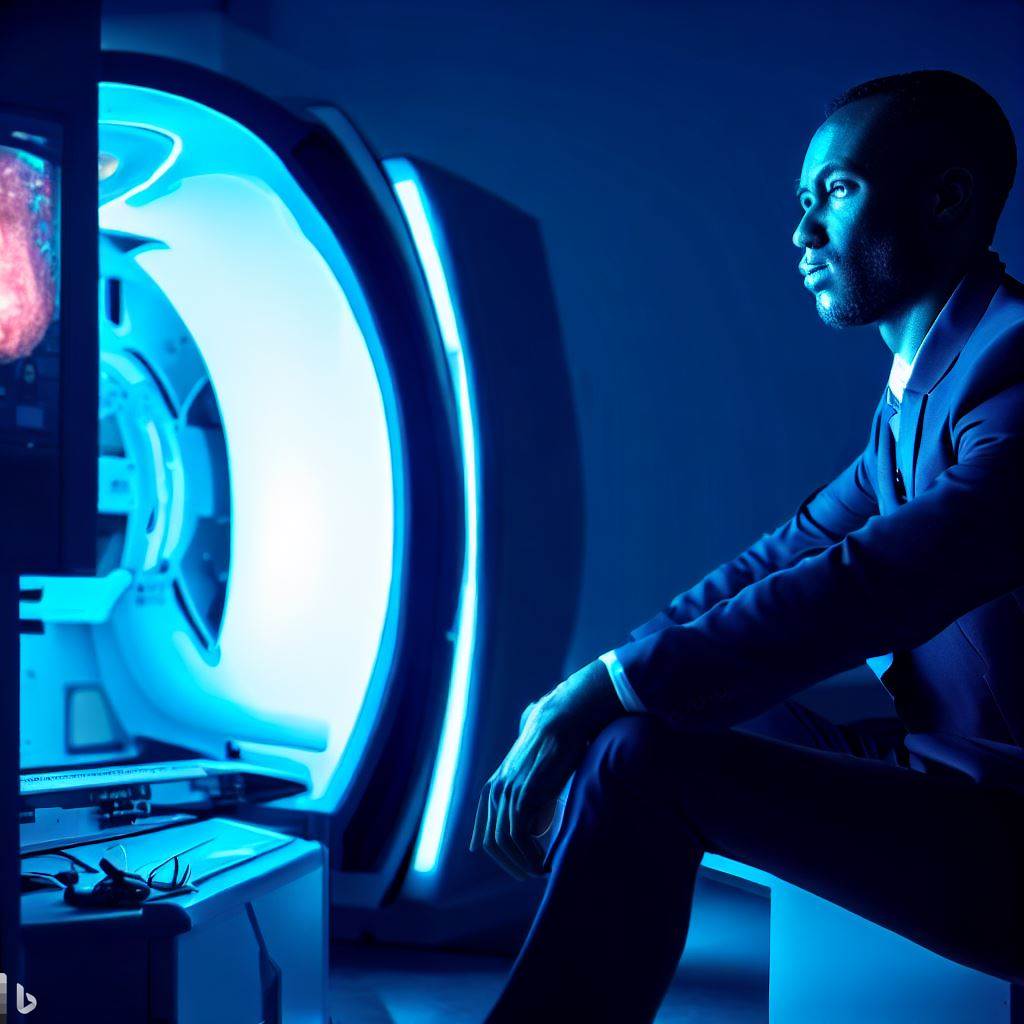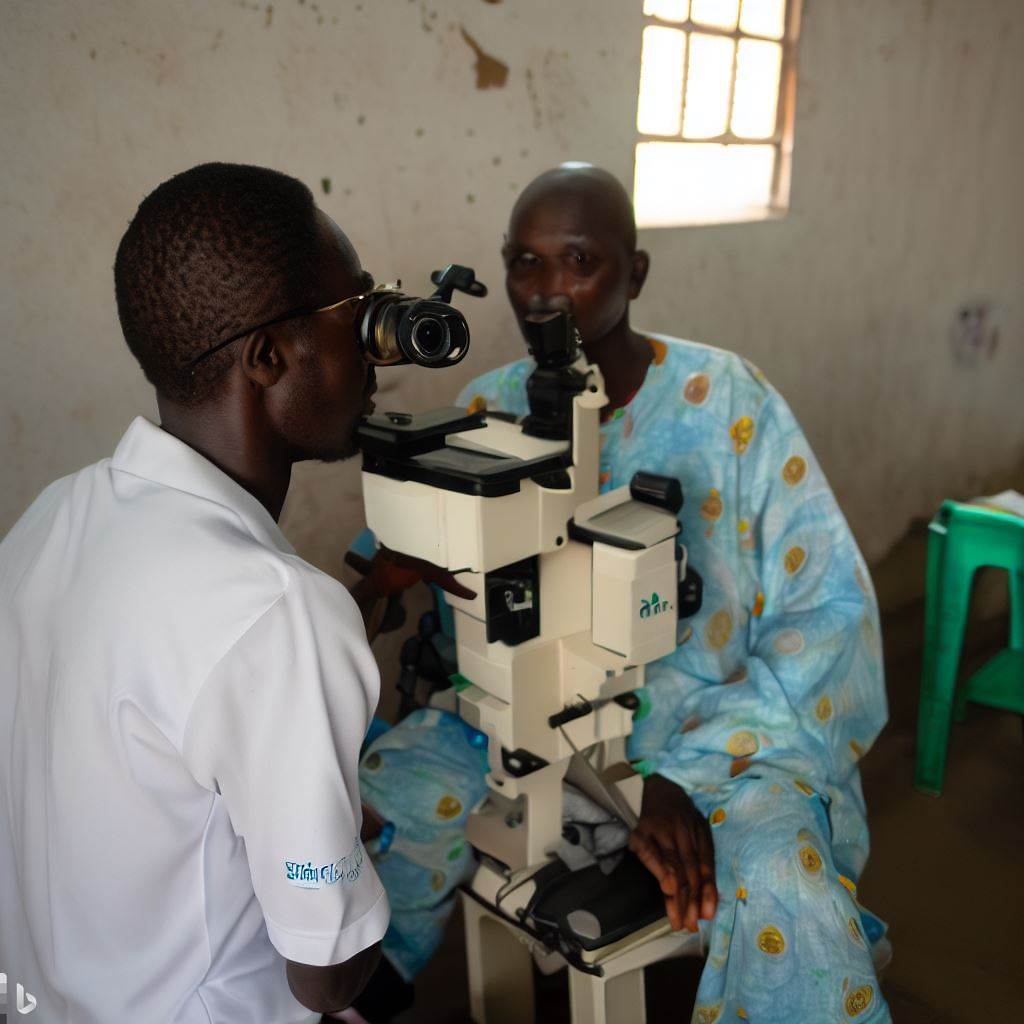Introduction
MRI technology, also known as magnetic resonance imaging, generates detailed body images using magnetic fields and radio waves.
It’s non-invasive and aids accurate diagnoses, making it indispensable in healthcare.
This advanced imaging technique captures multi-dimensional organ and tissue images, detecting early-stage diseases, injuries, and conditions.
The brilliance of MRI lies in its ability to capture multi-dimensional images of organs, tissues, and even intricate neurological pathways, offering valuable insights into the subtlest abnormalities or anomalies
In this blog, we will explore MRI’s principles, applications, advancements, and significant impact on medicine.
History of MRI Technology in Nigeria
The introduction of MRI technology in Nigeria can be traced back to the late 1980s, coinciding with significant developments and modernization in the country’s healthcare system.
At that time, MRI was recognized as a vital addition to the healthcare infrastructure, offering non-invasive imaging capabilities.
However, the adoption of MRI technology in Nigeria encountered several challenges. The high cost of acquiring MRI machines was a major obstacle, making it unaffordable for most healthcare facilities.
Consequently, MRI scans were limited to a few well-funded hospitals in major cities, restricting access for many patients.
Moreover, the scarcity of trained professionals proficient in operating and interpreting MRI scans posed another hurdle.
Specialized training was essential to ensure safe and effective utilization of the technology and accurate analysis of the images.
Unfortunately, Nigeria faced a shortage of radiologists and healthcare experts with expertise in MRI technology.
Despite these obstacles, recent years have seen significant progress in the availability and accessibility of MRI technology in Nigeria.
The government and international organizations recognized its importance in healthcare and implemented initiatives to make MRI machines more affordable and widespread.
Today, more MRI machines are installed in healthcare facilities across the country. The increase in trained professionals proficient in MRI operations has improved diagnostic capabilities and patient care.
Patients no longer need to travel far or face exorbitant costs to undergo MRI scans.
The current state of MRI technology in Nigeria’s healthcare system is positive.
However, continued investment in MRI technology is crucial to further enhance healthcare services in the country.
Establishing more training programs for skilled MRI professionals and sustaining efforts to reduce MRI machine costs and maintenance will ensure Nigeria maximizes the benefits of MRI technology for its healthcare system in the future.
Read: Career Switching to Occupational Therapy: A Nigerian Perspective
Advantages of MRI Technology in Nigeria’s Healthcare System
Advances in medical technology, such as MRI (Magnetic Resonance Imaging), have revolutionized the healthcare system in Nigeria.
This section explores the numerous advantages that MRI technology brings to the table.
Non-invasive nature of MRI scans
One of the biggest advantages of MRI technology is its non-invasive nature.
Unlike traditional methods, such as surgery, MRI scans do not require any incisions or invasive procedures. Patients can undergo an MRI without any pain or discomfort.
High-resolution images for accurate diagnosis
The high-resolution images generated by MRI machines provide healthcare professionals with detailed and accurate information.
The clarity of these images allows for better analysis and diagnosis of various health conditions.
Detection of various health conditions including tumors, infections, and brain disorders
MRI technology plays a crucial role in the early detection of a wide range of health conditions.
This includes the identification of tumors, both cancerous and non-cancerous, infections in different parts of the body, and disorders affecting the brain.
Benefits of early detection and prevention
Early detection of health conditions is vital for effective treatment and prevention.
MRI technology enables healthcare professionals to identify potential issues at an early stage, increasing the chances of successful treatment and improved patient outcomes.
The advantages offered by MRI technology in Nigeria’s healthcare system are truly remarkable.
The non-invasive nature of MRI scans ensures a comfortable experience for patients, promoting better accessibility and acceptance of medical procedures.
Moreover, the high-resolution images produced by MRI machines allow for accurate and precise diagnosis.
This effectively guides healthcare professionals in formulating the most appropriate treatment plans for their patients, resulting in better outcomes.
MRI technology’s ability to detect various health conditions, including tumors, infections, and brain disorders, is invaluable.
It aids in timely interventions and appropriate medical care, which significantly improve patient prognosis.
Perhaps the most significant advantage of MRI technology lies in its contribution to early detection and prevention.
By identifying potential health issues at a nascent stage, healthcare providers can implement preventive measures and mitigate the risk of further complications.
For instance, early identification of tumors through MRI scans facilitates prompt intervention and increases the likelihood of successful treatment.
It enables healthcare professionals to plan surgeries or recommend alternative therapies before the cancer spreads, significantly improving the survival rates of patients.
Similarly, the detection of brain disorders like strokes or multiple sclerosis at an early stage allows for timely interventions, preventing further damage and maximizing the chances of recovery.
Basically, its non-invasive nature, high-resolution imaging capabilities, and ability to detect various health conditions provide significant benefits to patients and healthcare professionals alike.
The early detection and prevention of health issues through MRI scans further enhance the overall effectiveness and success of medical treatment in Nigeria.
Read: Nigeria’s Demand for Occupational Therapists: An Analysis
Limitations and Challenges of MRI Technology in Nigeria
- High cost of MRI machines and maintenance.
- Limited availability of MRI machines in rural areas.
- Lack of trained MRI technicians and radiologists.
- Power supply issues affecting the functioning of MRI machines.
MRI technology has revolutionized Nigerian healthcare with its accurate and non-invasive imaging.
Despite its benefits, challenges hinder its full utilization.
High costs make it hard for many facilities, especially in rural areas, to acquire and maintain MRI machines.
Limited availability outside major cities forces patients to travel long distances for scans.
Additionally, a shortage of trained technicians and radiologists results in delays and compromised care.
The inconsistent power supply poses a risk to the delicate equipment.
Addressing these challenges is vital to fully harness the potential of MRI technology and improve healthcare access and outcomes in Nigeria.
Addressing these limitations and challenges is crucial for maximizing the benefits of MRI technology in Nigeria.
The following measures can be taken to mitigate the issues:
- Government and healthcare institutions should allocate more funds to make MRI machines affordable and ensure regular maintenance.
- Efforts should be made to expand the availability of MRI machines to underserved areas, especially rural communities.
- Investing in training programs and educational initiatives to increase the number of qualified MRI technicians and radiologists.
- Developing backup power systems, such as generators and uninterruptible power supply (UPS) units, to maintain a stable power source for MRI machines.
Essentially, while MRI technology offers immense potential in improving healthcare outcomes in Nigeria, it faces limitations and challenges that hinder its widespread implementation.
Overcoming these barriers will undoubtedly enhance the impact of MRI technology, making it more accessible and beneficial for all Nigerians.
Read: The Current State of Pediatric Medicine in Nigeria
Steps Taken to Improve MRI Technology in Nigeria
The advancement of MRI technology has revolutionized healthcare in Nigeria; however, there is still a need to improve and expand accessibility across the country.
To address this issue, various steps have been taken to enhance MRI technology in Nigeria’s healthcare system.
Efforts by the government to increase accessibility of MRI machines
The Nigerian government recognizes the importance of MRI technology and has undertaken initiatives to make these machines more accessible to the general population.
One of the key steps taken is the establishment of MRI centers in public hospitals across different states.
This helps to ensure that individuals from all socio-economic backgrounds have access to this crucial diagnostic tool.
Furthermore, the government has also worked towards providing financial support to these centers to lower the costs associated with MRI examinations.
This has significantly increased the affordability of MRI services for the general public, making it more accessible to those who previously could not afford it.
Training programs for MRI technicians and radiologists
Another crucial aspect of improving MRI technology in Nigeria is investing in human resources.
To ensure the proper operation and maintenance of MRI machines, the government and healthcare organizations have initiated training programs for MRI technicians and radiologists.
These programs aim to equip healthcare professionals with the necessary skills and knowledge to effectively operate MRI machines, interpret the results, and provide accurate diagnoses.
By enhancing the expertise of MRI technicians and radiologists, the overall quality of MRI services in Nigeria has significantly improved.
Collaborations with international healthcare organizations and partners
Nigeria has also been actively engaging in collaborations with international healthcare organizations and partners to enhance its MRI technology.
By leveraging the expertise and resources of these collaborations, Nigeria can gain access to advanced MRI equipment, training, and research opportunities.
Through these partnerships, Nigeria is able to tap into the latest advancements in MRI technology and implement them within its healthcare system.
This not only improves the accuracy and reliability of diagnoses but also enhances the overall capabilities of MRI technology in Nigeria.
Research and development initiatives to increase affordability of MRI technology
Recognizing the financial challenges associated with MRI technology, research and development initiatives have been undertaken to find ways to increase its affordability in Nigeria.
These initiatives focus on developing cost-effective alternatives that can deliver similar diagnostic capabilities.
For instance, researchers are exploring the use of portable or compact MRI machines that require less capital investment and maintenance costs.
By developing innovative approaches, Nigeria aims to make MRI technology more accessible to remote areas and smaller healthcare facilities.
In short, steps have been taken to improve MRI technology in Nigeria’s healthcare system.
The government’s efforts to increase accessibility, training programs for healthcare professionals, collaborations with international organizations, and research and development initiatives have contributed to the advancement of MRI technology in Nigeria.
With these measures in place, more Nigerians can benefit from the diagnostic capabilities offered by MRI machines, leading to improved healthcare outcomes throughout the country.
Read: Pros and Cons of the Pediatrician Profession in Nigeria

Impact of MRI Technology on Nigeria’s Healthcare System
Magnetic Resonance Imaging (MRI) technology has revolutionized the healthcare system in Nigeria, bringing significant improvements in diagnostic accuracy, patient care, and attracting foreign investments.
In this section, we will explore the impact of MRI technology on Nigeria’s healthcare system:
Improvements in Diagnostic Accuracy and Patient Care
- MRI technology has greatly enhanced the diagnostic accuracy of various medical conditions.
- It provides detailed images of organs, tissues, and structures, aiding in early detection of disorders.
- Doctors can accurately diagnose conditions such as tumors, cardiovascular diseases, and neurological disorders.
- With precise diagnoses, appropriate treatment plans can be developed and implemented with better outcomes.
- Patient care has also improved as MRI scans are non-invasive and painless, minimizing discomfort.
- Patients no longer have to undergo unnecessary surgeries or invasive procedures for accurate diagnoses.
Reducing the Need for Unnecessary Surgeries and Invasive Procedures
MRI technology has significantly reduced the need for exploratory surgeries and invasive procedures.
Physicians can now rely on MRI scans to identify the source and extent of abnormalities.
Reducing unnecessary surgeries not only saves costs but also eliminates associated risks and complications.
Patients can receive precise and targeted treatments, leading to faster recovery and improved quality of life.
Enhanced Treatment Planning and Monitoring
MRI scans provide detailed images that aid in treatment planning and monitoring.
Doctors can accurately determine the size, location, and characteristics of tumors or lesions.
With this information, customized treatment plans can be devised, optimizing the effectiveness of therapies.
MRI technology also enables doctors to monitor treatment progress and make necessary adjustments.
It helps identify any recurring or new abnormalities, ensuring timely interventions.
Attraction of Medical Tourists and Foreign Investments
Nigeria’s adoption of MRI technology has attracted medical tourists seeking advanced diagnostics.
Patients from neighboring countries and even farther regions now come to Nigeria for comprehensive MRI scans.
This influx of medical tourism brings in revenue and boosts the country’s healthcare sector.
Foreign investments have also increased as international healthcare companies recognize Nigeria’s MRI capabilities.
These investments lead to the expansion of healthcare facilities and the creation of employment opportunities.
MRI technology has had a profound impact on Nigeria’s healthcare system, improving diagnostic accuracy, patient care, and treatment outcomes.
With its ability to reduce unnecessary surgeries, enhance treatment planning and monitoring, and attract medical tourists and foreign investments, MRI technology continues to transform healthcare in Nigeria.
The future holds great potential for further advancements and growth in this field, ultimately benefiting both healthcare professionals and patients alike.
Read: Occupational Therapy Schools: Where to Study in Nigeria
Discover More: Exploring Gender Diversity in Nigeria’s O&P Profession
Future Outlook of MRI Technology in Nigeria
Potential Advancements in MRI Technology
- Continuous research and development will lead to improved imaging quality and accuracy.
- Advancements in MRI machine design will result in faster and more efficient scans.
- New imaging techniques and protocols will be developed to cater to specific medical conditions.
- Integration of artificial intelligence will enhance the diagnostic capabilities of MRI technology.
Increased Accessibility and Affordability in the Future
With time, costs associated with MRI scans are expected to decrease, making them more affordable.
Technological advancements will lead to the development of smaller and portable MRI machines.
These portable devices will increase accessibility to MRI technology, especially in remote or underserved areas.
Public-private partnerships and government initiatives will help in setting up more MRI centers across the country.
Role of MRI Technology in Achieving Universal Healthcare in Nigeria
- MRI technology plays a crucial role in early detection and accurate diagnosis of various medical conditions.
- By ensuring timely and precise diagnosis, MRI technology helps in preventing disease progression and complications.
- Early detection through MRI scans can lead to more effective treatment plans and improved patient outcomes.
- By enabling non-invasive imaging, MRI reduces the need for more invasive and costly diagnostic procedures.
- Universal access to MRI technology will help bridge the healthcare gap between rural and urban areas in Nigeria.
- By providing equal access to advanced diagnostic tools, MRI technology contributes to achieving equitable healthcare.
In summary, the future outlook of MRI technology in Nigeria appears promising. The potential advancements in technology, increased accessibility, and affordability will have a significant impact on healthcare delivery.
These advancements will allow for more accurate and timely diagnoses, leading to improved patient outcomes. Moreover, the role of MRI technology in achieving universal healthcare cannot be overstated.
By providing equal access to advanced diagnostic tools, MRI technology will contribute to ensuring equitable healthcare for all Nigerians.
It is crucial for policymakers, healthcare providers, and stakeholders to invest in the development and expansion of MRI technology to maximize its potential for the benefit of the Nigerian healthcare system.
Read: The Role of Exercise Physiology in Nigeria’s Sports Industry
Conclusion
The impact of MRI technology in Nigeria’s healthcare system has been significant.
MRI has revolutionized diagnostic imaging, allowing for more accurate and timely diagnoses.
It has improved patient care and outcomes, particularly in the detection and treatment of neurological disorders, cancers, and musculoskeletal conditions.
Furthermore, MRI technology has reduced the need for invasive procedures and surgeries, leading to cost savings and improved patient experiences.
Looking ahead, there are vast possibilities and opportunities for further development in MRI technology in Nigeria.
Advancements in image resolution, scanning speed, and accessibility can enhance its effectiveness in diagnosing and monitoring diseases.
Continuous support and investment in improving healthcare infrastructure are crucial to fully capitalize on the potential of MRI technology.
Increased availability of MRI machines, trained technicians, and radiologists will ensure widespread access to this vital diagnostic tool.
Moreover, collaboration between researchers, healthcare providers, and technology companies can drive innovation and push the boundaries of MRI capabilities.
By harnessing these advancements, Nigeria’s healthcare system can offer better healthcare services, reduce healthcare costs, and improve patient outcomes.
On a final note, MRI technology has already made a significant impact in Nigeria’s healthcare system, and continued development and support will lead to even greater advancements and improved healthcare in the future.




